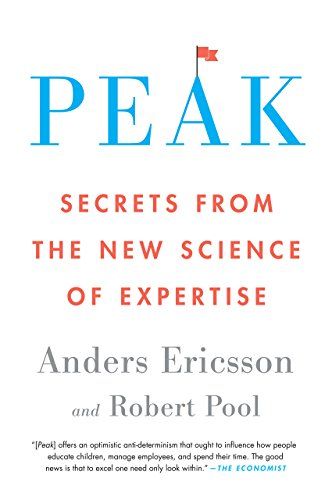
Peak
Rating: 9/10
Author: Anders Ericsson & Robert Pool Read The OriginalHigh-Level Thoughts
If you're trying to master any skill in life then this is the book for you. It's not how long your practice it's how you practice is one of the core ideas of the book. I love how this book is pretty much the accumulation of Ericsson's life work and research on the process of becoming an expert. It's all backed by experiments and science and disproves many of the myths that society has held up on a pedestal.
Peak Summary
You wish to climb a mountain, you can choose a random path and hope for the best, or you can rely on a guide who has been to the peak and knows the best way there. How far you want to climb is up to you.
- The right sort of practice carried out over a sufficient period of time leads to improvement. Nothing else.
- Get rid of the misconception that long hours doing something = eventual mastery, if that were the case everyone who has been driving for more than 10 years could become nascar drivers.
- All truly essential practice to get better work in the same way:
- Purposeful practice → Get outside your comfort zone but do it in a focused way, with clear goals, a plan for reaching those goals, and a way to monitor your progress + figuring out a way to stay motivated.
- It is possible to shpae your brain through conscious, deliberate training. The brain rewires your neurons depending on the type of practice you do, the longer you stay out of your comfort zone the more your body and brain has to adapt by reestablishing homeostasis.
Mental Representations
- These are preeexisting patterns of informations → facts, images, rules and relationships that are held in long term memory and that can be used to respond quickly and effectively in certain types of situations.
- Meaning aids memory, chess masters memorizing boards are very context dependent, and rely on patterns.
- Much of deliberate practice involves developing ever more efficient mental representations that you can use in whatever activity you are practicing.
- It's a virtuous cycle: the more skilled you become, the better your mental representations are, and the better your mental representations are, the more effectively you can practice to hone your skill.
The Gold Standard of Deliberate Practice
- Deliberate practice is purposeful practice that knows where it is going and how to get there.
- There are always objective ways to measure good performance. The field is competitive enough that performers have strong incentive to improve and it is well established, with many coaches and teachers.
- Always takes place outside the person's comfort zone.
- Requires full attention and conscious actions.
- Requires clearly defined specific goals and feedback to modify and monitor your practice.
- Building and modifying mental representations
- Focusing on building and improving specific skills by focusing on aspects of those skills and improving them
Practicing While Getting Work Done
Three myths:
- Our abilities are limited by pre-determined genetic characteristics
- If you do something for long enough you’re bound to get better at it
- All it takes to improve is effort
- Deliberate practice can be applied while you're working. If you're giving a presentation during a meeting, look for something to improve on and after you finish ask for feedback. Repeat and work on weaknesses.
- Knowledge is never enough, it's necessary however the most important thing is actually doing, not observing.
Deliberate Practice in Daily Life
- Find a good teacher, this is ideal, as they can pinpoint what you need to specifically improve on. If you feel yourself plateauing find a better teacher.
- "It is better to train at 100% effort for less time than at 70% effort for a longer period"
- You need extreme focus in order to improve, this is necessary because you need to be aware at all times to catch mistakes and see if you're on the right path.
- If you don't have a teacher, find great work and try to replicate it. Keep practicing until you can comprehend and do it from scratch without any hints.
- The best way to move past a plateau is to challenge your body or mind in a new way.
- To maintain your motivation you can either strengthen the reasons to keep going or weaken the reasons to quit.